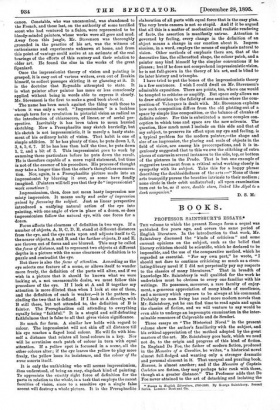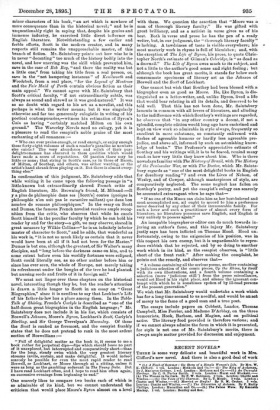BOOKS.
PROFESSOR SAINTSBURY'S ESSAYS.*
THE volume to which the present Essays form a sequel was published five years ago, and covers the same period of English literature. In the introduction to that work, Mr. Saintsbury discussed the "kinds of criticism" and some current opinions on the subject, such as the belief that literary criticism should be scientific, which he declared to be impossible, and the use of the comparative method, which he regarded as essential. "For my own part," he wrote, "I should not dare to continue criticising so much as a circu- lating-library novel if I did not perpetually pay my respects to the classics of many literatures." That in breadth of knowledge Mr. Saintsbury is well qualified for the work he undertakes must be obvious to every one familiar with his writings. He possesses, moreover, a rare faculty of enjoy- ment, a generous appreciation of many kinds of excellence, and a memory which appears to be always at his command. Probably no man living has read more modern novels than Mr. Saintsbury, yet he can find time to read again and again the classics of fiction, and we will venture to say would be even able to undergo an impromptu examination in the inter- minable romances of Calprenede and de Scrideri.
Three essays on "The Historical Novel" in the present volume show the author's familiarity with the subject, and his critical appreciation of the method adopted by the great masters of the art. Mr. Saintsbury goes back, which we need not do, to the origin and progress of this kind of fiction. In England De Foe, the father of modern fiction, produced in the Memoirs of a Cavalier, he writes, "a historical novel almost full-fledged and wanting only a stronger dramatic and personal element in it That unequal and puzzling book, Roxana, is almost another; and if the Memoirs of Captain Carleton are fiction, they may perhaps take rank with these, though at a greater distance." The Professor adds that De Foe never attained to the art of detaching and isolating the
• Essays in English Literature, 1780-1860. By George Saintsbury. Second Series. London: 1Xnt and Co.
minor characters of his book, "an art which is nowhere of more consequence than in the historical novel;" and he is unquestionably right in saying that, despite his genius and immense industry, he exercised little direct influence on English literature. Notwithstanding a few earlier and feeble efforts, Scott is the modern creator, and in many respects still remains the unapproachable master, of this branch of fiction. Mr. Saintsbury points out how wise he is in never "decanting" too much of the history bodily into the
novel, and how unerring was the skill which prevented him, save in the case of Bob Boy, "and there the reality was but a little one," from taking his title from a real person, or, save in the "not hampering instances" of Kenilworth and Woodstock, from a real place, "for the Legend of Montrose and the Fair Maid of Perth contain obvious fiction as their
main appeal." We cannot agree with Mr. Saintsbury that Scott's critical faculty, "if not extraordinarily subtle, was always as sound and shrewd as it was good-natured." It was so no doubt with regard to his art as a novelist, and this perhaps is what the writer means ; but it was singularly otherwise and far too generously eulogistic in writing of his poetical contemporaries,—witness his estimation of Byron's Cain as having "certainly matched Milton on his own ground." The Waverley Novels need no eulogy, yet it is a pleasure to read the essayist's noble praise of the most enchanting of all romances :—
"Who can ever praise enough, or read enough, or enjoy enough those forty-eight volumes of such a reader's paradise as nowhere else exists ? The very abundance and relish of their pure delightsomeness has obscured in them qualities which would have made a score of reputations. Of passion there may be little or none; that string in Scott's case, as in those of Bacon, of Milton, of Southey, and others, was either wanting or the artist's hand shrank from playing on it. But there is almost every- thing else."
In confirmation of this judgment, Mr. Saintsbury adds that while writing it he came upon the following passage in "a little-known but extraordinarily shrewd French critic of English literature, Mr. Browning's friend, M. Milsand :—I1 y a plus de philosophie clans see [Scott's] cantos (quoique la philosophie n'en Boit pas le caractere saillant) que clans bon nombre de romans philosophiques." In the essay on Scott and Dumas, the famous French novelist receives ample recog- nition from the critic, who observes that while he excels Scott himself in the peculiar faculty by which he can hold his reader by and for the story—a gift, we may observe, shared in great measure by Wilkie Collins—" he is an infinitely inferior master of character to Scott," and he adds, that wonderful as his work is, "it is not so much likely as certain that it never would have been at all if it had not been for the Master." Dumas is but one, although the greatest, of Sir Walter's many disciples, and "long before the darkness came on him, and to some extent before even his worldly fortunes were eclipsed, Scott could literally see, as no other author before him or since has ever seen, the whole of Europe, not merely taking its refreshment under the boughs of the tree he had planted, but nursing seeds and fruits of it in foreign soil."
We must not linger over these chapters on the historical novel, interesting though they be, but the reader's attention is drawn a little longer to Scott in an essay on "Great
Biographies," since it is needless to say that Lockhart's Life of his father-in-law has a place among them. In the Table-
Talk of Shirley, Froude's Carlyle is described as "one of the half-dozen great biographies in the English language ; " Mr. Saintsbury does not include it in his list, which consists of Boswell's Johnson, Moore's Byron, Lockhart's Scott, Carlyle's Sterling. and Sir George Trevelyan's Macaulay. Of these the Scott is ranked as foremost, and the essayist frankly states that he does not pretend to rank in the most ardent section of Boswellians
"Full of delightful matter as the book is, it seems to me a book rather for perpetual dips—dips which should leave no part of it unexplored, but interrupted and comparatively short—than for the long, steady swim which the very greatest literary streams invite, sustain, and make delightful. It would indeed scarcely be possible for even the most rapid reader to read Boswell, or Lockhart, or Moore through at a sitting, unless it were as long as the gambling sedernnt in The Young Duke. But I have read Lockhart often, and I hope to read him often again, on successive evenings from beginning to end."
One scarcely likes to compare two books each of which is so admirable of its kind, bat we cannot understand the criticism that would place Moore's Byron almost on a level with them. We question the assertion that "Moore was a man of thorough literary faculty." He was gifted with
great brilliancy, and as a satirist in verse gives us of his best. Both in verse and prose he has the pen of a ready writer, but, in our judgment, the "thorough literary faculty"
is lacking. A tawdriness of taste is visible everywhere; his most masterly work in rhyme is full of blemishes ; and, with the exception of The Life of Byron, his prose, to quote Chris- topher North's estimate of Gilman's Coleridge, is "as dead as a doornail." The Life of Byron owes much to its subject, and not a little to the author's good sense and right feeling ; but although the book has great merits, it stands far below such consummate specimens of literary art as the Johnson of Boswell and the Scott of Lockhart.
One cannot but wish that Southey had been blessed with biographer even as good as Moore. He, like Byron, is dis- tinguished as a letter-writer, and, unlike Byron, lived a life that would bear relating in all its details, and 'deserved to be told well. That this has not been done, Mr. Saintsbury laments in common with all lovers of literature, and alluding to the indifference with which Southey's writings are regarded, he observes that "in any other country a decent, if not a
splendid, complete edition would long ago have enshrined and kept on view work so admirable in style always, frequently so excellent in mere substance, so constantly enlivened with flashes of agreeable humour or hardly less agreeable pre-
judice, and above all, informed by such an astonishing know- ledge of books." The Professor's appreciative estimate of Southey and his writings will, it is to be feared, remind many readLrs how very little they know about him. Who is there nowadays familiar with The History of Brazil, with The History of the Peninsular War, or with The Doctor, which Mr. Saints- bury regards as "one of the most delightful books in English for desultory reading"? and even the Lives of Nelson, of Wesley, and of Cowper, although masterpieces of style, are comparatively neglected. The same neglect has fallen on Southey's poetry, and yet the essayist's eulogy can scarcely be accounted extravagant when he says that-
" If no one of the Muses can claim him VA her best-beloved and most accomplished son, all ought to accord to him a preference never deserved by any other of their innumerable family. For such a lover and such a practitioner of almost every form of literature, no literature possesses save English, and English is very unlikely to possess again."
An incapable biographer or editor can do much towards in-
juring an author's fame, and this injury Mr. Saintabary justly says has been inflicted on Thomas Hood. Hood un- fortunately, owing to the exigencies of his position, was in this respect his own enemy, but it is unpardonable to repro- duce rubbish that he rejected, and by so doing to smother work which in its kind, as the essayist observes, is "little short of the front rank." After making the complaint, he points out the remedy, and observes that— "A volume containing all the serious poems, another containing a judicious selection of the comic pieces. Up the Rhine, by itself with its own illustrations, and a fourth volume containing a. selection (more judicious still ') from the prose miscellanies, would set Hood in his right place, and silence the ignorant con- tempt with which he is sometimes spoken of by ill-read persons of the present generation."
We wish that Mr. Saintsbury would undertake a work which has for a long time seemed to us needful, and would be mat* of mercy to the fame of a good man and a true poet.
The essays include papers on Cobbett, Landor, Thomas Campbell, Miss Ferrier, and Madame D'Arblay, on the three humourista, Hook, Barham, and Maginn, and on political satire. The literary food provided is therefore various; and if we cannot always admire the form in which it is presented,
for style is not one of Mr. Saintsbury's merits, there is always ample matter provided for discussion and enjoyment.



































 Previous page
Previous page